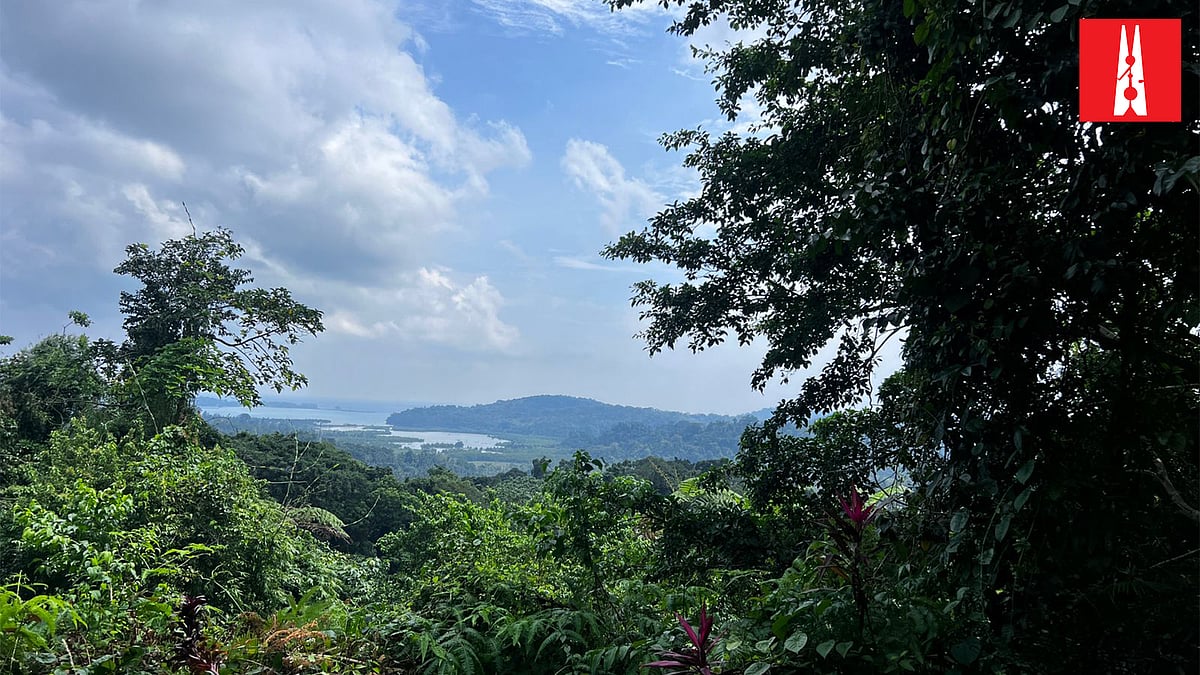Secrecy around Great Nicobar review report violates 'natural justice': Petitioner to NGT
The NGT was hearing two interlocutory applications seeking the public disclosure of the high-powered committee’s report on the contentious Great Nicobar project.
Arguing before the National Green Tribunal (NGT) on Friday, the counsel for petitioner Ashish Kothari, environmentalist and founder of the non-profit Kalpavriksh, pressed for public disclosure of the high-powered committee’s (HPC) report on the controversial Great Nicobar project, asserting that citizens “have a right to know” what the assessment contains.
The NGT has reserved its order.
The tribunal was hearing two interlocutory applications seeking that the report – submitted by the Ministry of Environment, Forest and Climate Change (MoEFCC) in a sealed cover on October 30 – be made public. The NGT had set up the HPC in 2023, chaired by former MoEFCC secretary Leena Nandan, to examine “deficiencies” in the Rs 81,000-crore project, including coral translocation, environmental impact assessment data, and no-go coastal zones.
Petitioner Ashish Kothari has alleged violations of environmental laws. Environmental groups have warned that the large infrastructure project, which includes a port, airport, township and power facilities, will irreversibly damage the fragile Nicobar ecosystem. Of 166.10 sq km required for the project, 130.75 sq km is forest. Government assessments estimate that at least 10 lakh trees will be felled.
“We have the right to know what has transpired after NGT’s judgment. Had the entire project been kept out of public scrutiny and justified as a national-security project, we would be dealing with an entirely different case. This is not that. The entire process was in the public domain. EIAs (environmental impact assessments) are available. Public hearings were held. But the ministry now says the revisiting of the project is confidential. This does not call for national security or sealed privilege,” the petitioner’s counsel argued before the six-member bench led by NGT chairperson Justice Prakash Shrivastava.
Opposing the plea, the MoEFCC counsel argued that the two interlocutory applications had been filed “at the fag end of the case.” She submitted that the national-security position “was known throughout,” adding that the Tribunal’s March order had already recorded the Additional Solicitor General’s (ASG) submission that they would not make the HPC report public.
During a hearing in March, ASG Aishwarya Bhati informed the NGT that the report was “confidential in nature” and couldn’t be placed on record.
‘HPC report does not fall within the purview of national security’
On Friday, the petitioner’s counsel countered that the Ministry had yet to prove that either the project or the HPC report fell within the purview of national security.
“It is for the respondent (MoEFCC) to plead and prove that the project is for national security,” he said, adding that the Ministry had not done so in its written submissions. “The principle of natural justice has been thrown out of the window.”
“What can be confidential in the report when the location is known, the layout is known, what they propose to use it for is known; the capacity of the proposed port is known; the size of the township is also known. Everything is in the public domain,” he added.
In the affidavit, the petitioner listed 44 project-related documents available in the public domain—from environment and wildlife clearances to EIA files and NITI Aayog deliberations between 2015 and 2025.
At this point, the expert member, Afroz Ahmad, asked whether the HPC report itself was in the public domain. “You have mentioned that every piece of information related to the project is in the public domain. At the same time, you are saying it’s not being made available to you,” remarked Ahmad.
“My Lord, the HPC report is not in the public domain. That’s the point,” the counsel replied.
The affidavit, submitted by the petitioner’s counsel to the NGT on Thursday, claimed the MoEFCC had “magically” assumed the project to be confidential.
“When all information leading to the clearance is in the public domain… it is preposterous and utterly without merit to claim that the report of the re-examination exercise has suddenly and magically assumed ‘strategic and national importance’ and has confidential and privileged information,” the affidavit stated.
Justice Shrivastava clarified the petitioner’s prayers. “The first prayer is that if we rely on the report, a copy has to be supplied to you. The second is that if we don’t rely on it, then we should confine ourselves to the original application. Right?” he asked. The counsel agreed.
‘Cannot conceal information related to the entire project’
The petitioner's counsel argued that the government can’t conceal information related to the entire project. He claimed that only information related to the proposed airport could fall within the purview of “national security,” as the Union Ministry of Home Affairs termed it so in 2022, given its dual civil-defence use.
“That’s why they can’t raise the bogey of national security to keep the report away… The minute one party has access to information that the petitioner is not privy to but the court is, it scuttles the entire proceedings. And that’s an anathema to the open-court principle,” he said.
He added that the MoEFCC had never invoked national security in its written submissions to justify withholding the report. “It’s mentioned orally by the ASG,” he said.
In the original application filed in 2024, petitioner Kothari alleged that the translocation of coral reefs and the removal of the leatherback turtle nesting ground from the no-go development zone violated the Coastal Zone Regulation Act and other environmental laws.
The petitioner's counsel on Friday argued that government records show the proposed port area is a turtle-nesting ground, designated as a no-development zone under the CRZ-1A category. Last year, the HPC informed the NGT that the port site did not fall under CRZ-1A, citing a ground-truthing exercise by the National Centre for Sustainable Coastal Management. “In two days, NCSCM has decided that now it is not CRZ-1A,” said the petitioner's counsel.
He also argued that the law does not permit coral translocation. “It’s not like translocating trees. The whole ecosystem has to be translocated.”
He added, “I am not asking the ministry to extend protection to an area. Please don’t mistake me. I am only saying the protection already exists. You have recognised it. Don’t dismantle it surreptitiously to permit the project. It’s okay for the project proponent to deny the existence of coral reefs, but not for the ministry."
If the government can hike print ad rates by 26 percent, we can drop our subscription prices by 26 percent. Grab the offer and power journalism that doesn’t depend on advertisers.
 Great Nicobar: Union govt plans Rs 81,000 cr project without even mapping tribal lands
Great Nicobar: Union govt plans Rs 81,000 cr project without even mapping tribal lands What’s Your Ism? Rishika Pardikar on India’s climate crisis, vulnerable communities
What’s Your Ism? Rishika Pardikar on India’s climate crisis, vulnerable communities